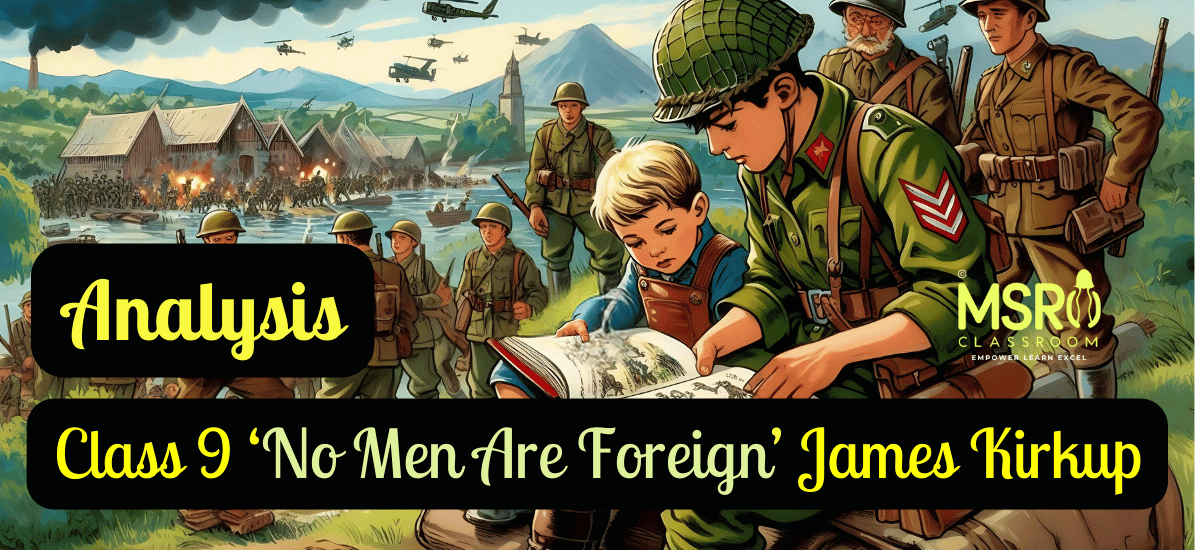Poem 6, James Kirkup’s ‘No Men Are Foreign’ Summary, Theme, Line-by-Line Explanation, Analysis, Textbook Exercises, Extract-Based Questions and Extra Questions.
Poem 6- ‘No Men Are Foreign’ by James Kirkup:
James Kirkup
James Kirkup (1918-2009) was a British poet, translator, and journalist. Beyond poetry, Kirkup worked as a foreign correspondent and authored numerous books. His career spanned decades and impacted the literary landscape, exploring themes of love, spirituality, and societal norms.

Table of Contents
Also Read: Class 9- “On Killing A Tree” Complete Analysis, Class 9- “A Slumber Did My Spirit Seal” Analysis
Supplementary Reader: Class 9 ‘Moments‘
Summary “No Men Are Foreign”:
‘No Men Are Foreign’ by James Kirkup is a powerful anti-war poem that advocates unity and compassion for everyone, regardless of nationality or background. The poet emphasises the shared humanity that connects individuals worldwide. In each stanza, Kirkup urges readers to remember that beneath superficial differences, all people share an ordinary existence on Earth.
He highlights universal human experiences, such as the need for sustenance, the impact of nature, and the commonality of love and strength. The poem concludes by reiterating that no one is truly foreign and that the collective human responsibility is to preserve and respect the Earth. The poem promotes the idea of global unity and understanding.
Explanation (Stanza-Wise) “No Men Are Foreign”:
Stanza 1: The speaker urges readers to remember that no one is a stranger, and no nation should be seen as foreign. Underneath uniforms and superficial differences, everyone shares a common humanity, and the Earth is a collective burial ground.
Stanza 2: The stanza highlights the commonality of basic human needs, such as sunlight, air, and water. It acknowledges that people, regardless of their nationality, suffer during times of war and deprivation. The reference to “war’s long winter starv’d” suggests the universal impact of conflict.
Stanza 3: The speaker points out that people in other lands are just like us, with similar eyes, the ability to experience joy and sorrow, and the capacity for strength that can be nourished by love. The labour they engage in is not fundamentally different from our own.
Stanza 4: The stanza addresses the destructive nature of hatred and war. The speaker warns against hating or harming our fellow human beings, as doing so ultimately harms ourselves. Taking up arms against each other results in a collective defilement of the Earth.
Stanza 5: The final stanza reiterates the central message: no individuals are foreign, and no countries are truly strange. It encourages readers to remember the interconnectedness of humanity and the shared responsibility for the Earth’s well-being. The poem serves as a plea for empathy, understanding, and unity amid divisions and conflicts.
Literary Analysis “No Men Are Foreign”:
In the first stanza, Kirkup challenges the notion of strangeness among men and foreignness among countries, asserting that all people share a common humanity beneath superficial distinctions. The imagery of a single body breathing suggests a universal connection and interdependence.
The second stanza extends this idea by highlighting shared experiences, such as being aware of the natural elements and facing peaceful and challenging times. The emphasis on commonality in labour and the the idea that humanity is interconnected.
The third stanza focuses on shared human experiences of waking and sleeping, and onthe potential for strength through love. Kirkup emphasises the universality of life, suggesting that people everywhere can recognise and understand its fundamental aspects.
The fourth stanza takes a critical turn, warning against the destructive consequences of hatred and division. It cautions that when we harbour animosity towards others, we ultimately harm ourselves and betray our shared humanity. The poet suggests that the true enemy is not the perceived ‘other’ but rather the self-destructive nature of hatred.
The final stanza reinforces the poem’s central message, condemning the defilement of the “human earth” through conflict and violence. Kirkup implores readers to remember that no one is foreign, and no country is strange, urging a collective acknowledgement of our shared responsibility for the world we inhabit.
‘No Men Are Foreign’ is a compelling call for empathy, understanding, and recognising our common humanity in the face of cultural, national, and ideological differences.
Highlighted Points:
- Unity of Humanity: The poem underscores the idea that all humans share a common existence beneath the superficial differences of nationality and uniforms. The use of phrases like “a single body breathes” and “earth like this, in which we all shall lie” emphasises the interconnectedness of humanity.
- Shared Experiences: Kirkup highlights the shared experiences of people worldwide, such as the awareness of nature (sun, air, and water) and the commonality of labour. The poet suggests that everyone undergoes similar struggles and joys regardless of background.
- Appeal for Compassion: The poet urges readers to empathise with others by reminding them that people in other countries have the exact basic needs, feelings, and aspirations. The appeal for compassion extends to a call for understanding and tolerance, rather than hatred or condemnation.
- Humanising the ‘Other’: By emphasising common human attributes like eyes, strength, and the capacity for love, Kirkup humanises those perceived as different or foreign. This challenges stereotypes and prejudices, promoting a more inclusive perspective.
- Anti-War Message: The poem strongly argues against war and its dehumanising effects. The mention of war’s impact on harvests and the shared hands and lines in the third stanza suggest that the consequences of conflict are universal, affecting everyone.
- Self-Reflection: The poet warns against the consequences of hating and harming others, emphasising that such actions ultimately harm ourselves. The “human earth” despoiling in the final stanza suggests that the destructive consequences of war and hatred affect the shared human environment.
Type:
‘No Men Are Foreign’ by James Kirkup is a didactic or moralistic poem that conveys a specific message or moral lesson. The poet employs the verses to advocate for universal brotherhood, peace, and understanding among people, regardless of national or cultural differences.
The poem’s didactic nature is evident in its explicit call to remember and recognise the shared humanity that unites all individuals.
Tone:
- Earnest: The poet expresses a sincere and heartfelt plea for understanding and unity. The repetition of the word “Remember” throughout the poem underscores the earnest desire to convey a crucial message about the shared humanity of all people.
- Contemplative: The poem encourages readers to reflect on the similarities among human beings and the consequences of hatred and war. The reflective nature of the verses prompts contemplation on the interconnectedness of humanity.
- Didactic: The poem serves as a moral lesson or teaching (didactic). It imparts a clear message about the need for compassion, empathy, and the recognition of commonality among diverse individuals. The poet instructs readers to remember the shared human experience and reject divisive attitudes.
- Optimistic: Despite addressing the negative aspects of hatred and war, the overall tone carries an optimistic undertone. The poet believes in the possibility of fostering understanding and peace among people by emphasising their shared humanity.
‘No Men Are Foreign’ consists of five stanzas, each with four lines (quatrains).
Theme “No Men Are Foreign”:
Universal Humanity:
- James Kirkup’s poem ‘No Men Are Foreign‘ centres on universal humanity. The poet emphasises the commonality that binds all individuals, transcending boundaries of nationality, race, and uniforms.
- Kirkup highlights the shared human experiences of life, love, and suffering through vivid imagery and poignant language. The poem serves as a powerful call to reject prejudice, hatred, and the dehumanisation of others.
- It advocates for a collective understanding of our interconnectedness, portraying nature as a unifying force. Ultimately, the theme celebrates the idea that, despite differences, there is an intrinsic unity that makes no one a stranger and no country foreign.
Symbolism “No Men Are Foreign”:
- Uniforms: The mention of uniforms in the first stanza can be seen as a symbol of national identity and divisions. Beneath the uniforms, however, the poem suggests a shared humanity.
- Land and Earth: The repetition of the idea that the land others walk upon is “earth like this, in which we all shall lie” symbolises the commonality of the human experience. It represents the shared destiny of all people, regardless of their nationality or origin.
- Sun, Air, Water: The second stanza’s references to sun, air, and water symbolise the fundamental elements that sustain life. These elements are universal and shared by people in all countries, emphasising the commonality of the human experience.
- Hands and Lines: The hands mentioned in the second stanza symbolise labour and work. The lines on the hands are likely a symbol of the shared experiences and challenges faced by people in different lands, highlighting the commonality of human struggles.
- Eyes, Sleep, and Strength: The third stanza mentions eyes that wake or sleep and strength that can be won by love, symbolising the shared human experiences of consciousness, rest, and the transformative power of love.
- Air: The air in the fourth stanza symbolises the shared atmosphere that belongs to everyone. The poem suggests that the consequences of war, such as “hells of fire and dust,” outrage the innocence of the air, emphasising the interconnectedness of humanity and the environment.
- Foreign and Strange: The repeated use of “foreign” and “strange” symbolises prejudices and biases based on nationality. The poem challenges these notions, urging readers to see beyond perceived differences and recognise the shared humanity.
- Human Earth: The phrase “It is the human earth that we defile” symbolises humanity’s collective responsibility for the planet’s well-being. It suggests that the Earth belongs to all humans, and actions that harm it are ultimately self-destructive.
Line-by-Line Explanation “No Men Are Foreign”:
- “Remember, no men are strange, no countries foreign”
- The poet urges readers to reject the idea that people from other nations are strange or foreign, emphasising the shared humanity of all individuals.
- “Beneath all uniforms, a single body breathes”
- Despite external differences, such as uniforms, the poet emphasises that everyone shares a common human essence.
- “Like ours: the land our brothers walk upon
- Is earth like this, in which we all shall lie.”
- The land that people in other nations walk on is the same earth on which everyone will eventually be buried, emphasising a shared destiny.
- “They, too, aware of sun and air and water,”
- People in other countries are also aware of and affected by the basic elements of nature.
- “Are fed by peaceful harvests, by war’s long winter starv’d.”
- People experience both the benefits of peaceful times, such as bountiful harvests, and the hardships of war, which lead to starvation during long winters.
- “Their hands are ours, and in their lines we read
- A labour not different from our own.”
- The work and labour of people in other nations are not fundamentally different from our own, emphasising a shared human experience.
- “Remember they have eyes like ours that wake
- Or sleep, and strength that can be won
- By love.”
- People everywhere share common experiences, such as waking and sleeping; strength can be nurtured through love.
11. “In every land is common life
12. That all can recognise and understand.”
- There is a universal aspect to life that all people, regardless of nationality, can recognise and understand.
- “Let us remember, whenever we are told
- To hate our brothers, it is ourselves
- That we shall dispossess, betray, condemn.”
- The poet warns against being influenced to hate others, emphasising that such hatred harms oneself through displacement, betrayal, and condemnation.
- “Remember, we who take arms against each other”
- The poet addresses the destructive nature of conflict and war.
- “It is the human earth that we defile.”
- The impact of war is portrayed as a violation of the shared human environment.
- “Our hells of fire and dust outrage the innocence
- Of air that is everywhere our own,”
- The destructive consequences of war, such as fire and dust, harm the purity of the air, affecting everyone.
- “Remember, no men are foreign, and no countries strange.”
- The concluding lines reiterate the central message, urging readers to remember that no one should be considered foreign or strange; all people are interconnected by their shared humanity.
Literary Devices “No Men Are Foreign”:
Question and Answers “No Men Are Foreign”:
Textbook Questions Answers:
Q1: (i) “Beneath all uniforms …” What uniforms do you think the poet speaks about?
A(i): In the line “Beneath all uniforms, a single body breathes,” the poet is likely speaking metaphorically about the uniforms symbolising various distinctions, such as nationalities, occupations, or roles.
The uniforms could represent the external differences and divisions that people create, whether through national or professional affiliations. The idea is that, despite these outward differences, there is a shared humanity beneath them.
(ii) How does the poet suggest everyone on earth is the same?
A(ii): The poet suggests that everyone on earth is the same by emphasising everyday human experiences and characteristics. The shared elements include breathing, walking on the same earth, experiencing the sun, air, and water, being nourished by harvests, and enduring the struggles of war. By highlighting these universal aspects of human existence, the poet seeks to convey the idea that, regardless of cultural or geographical differences, people fundamentally share a common humanity.
Q2. In stanza 1, find five ways we all are alike. Pick out the words.
A2: In stanza 1, James Kirkup highlights ways in which people are alike:
- “no men are strange” – Emphasizes that there are no strangers among men, suggesting a shared human connection.
- “a single body breathes” – Highlights the commonality of physical existence, indicating that all individuals share the act of breathing.
- “the land our brothers walk upon” – Describes a shared Earth, emphasising a common dwelling place for all individuals.
- “Is earth like this” – Reiterates the shared experience of living on the same planet, emphasising common ground.
- “in which we all shall lie” – Points to a shared destiny of mortality, highlighting that all individuals will eventually be buried in the same earth.
These phrases collectively convey the poet’s message about the fundamental similarities that unite all people, irrespective of external differences.
Q3. How many common features can you find in stanza 2? Pick out the words.
A3: In stanza 2, the poet James Kirkup continues to emphasise common features and experiences shared by people across different nations. Here are the words and phrases that highlight these commonalities:
- “sun and air and water” – These elements of nature are universal and experienced by people everywhere.
- “fed by peaceful harvests” – Points to the commonality of relying on the earth for sustenance during times of peace.
- “by war’s long winter starv’d” – Highlights the shared suffering during times of war, emphasising the universal impact of conflict.
- “Their hands are ours” – Suggests a commonality in labour and work, emphasising shared efforts.
- “in their lines we read” – Implies a shared history and experiences that others can understand.
These words and phrases collectively highlight the poet’s message that people worldwide share common experiences, whether in times of peace or war and that the human condition transcends national boundaries.
- “A labour not different from our own” – Reinforces the idea that the work and struggles of people in other nations are fundamentally similar to ours.
Q4: “…whenever we are told to hate our brothers …” When do you think this happens? Why? Who ‘tells’ us? Should we do as we are told at such times? What does the poet say?
A4:
- The line “whenever we are told to hate our brothers” suggests instances where external influences, such as political or ideological agendas, may manipulate people into harbouring hatred or animosity towards others. (when)This could occur during conflict, war, or political tension (why), where divisive narratives are propagated to serve particular interests.
- No, we should resist succumbing to such messages of hatred. An individual should always question the legitimacy and morality of such directives. Individuals should not unthinkingly follow instructions to hate their fellow human beings.
- The poet’s stance is clear: he advises against mindlessly following instructions to hate. Instead, he encourages readers to remember the shared humanity, common experiences, and interconnectedness of all people on earth. The poet advocates for understanding, empathy, and unity in the face of attempts to sow discord and hatred.
Extra Questions “No Men Are Foreign”:
Q1: What is the central theme of James Kirkup’s poem ‘No Men Are Foreign’?
A1: The poem’s central theme is universal brotherhood and the shared humanity of all people, emphasising the idea that there are no “strange” men or “foreign” countries. It calls for understanding, empathy, and unity among individuals regardless of nationality or differences.
Q2: What does the poet suggest about commonalities between people in different countries?
A2: The poet means that beneath external differences, such as uniforms and nationalities, there is a shared humanity among people in different countries, which are beneath superficial differences, such as uniforms and nationalities.
They experience the same essential elements: emphasising the sun, air, water, and the need for sustenance. The poem emphasises the similarities in the human experience and the commonality that unites all people.
Q3: How does the poem address the consequences of war and hatred?
A3: The poem addresses the consequences of war and hatred, suffering and humanity of those in different countries. It notes that people in other nations also face the effects of war, including hunger during prolonged conflicts.
The poem condemns the idea of hating one’s brothers and emphasises that such hatred ultimately harms oneself and defiles the collective human existence.
Q4: What is the poet’s message regarding the responsibility of individuals in times of conflict?
A4: The poet’s message is a call for individuals to resist hatred and the dehumanisation of others during times of conflict. It urges readers to remember that taking arms against each other harms those considered enemies and damages the shared human earth.
The poem emphasises personal responsibility in promoting understanding, empathy, and peace, while discouraging actions that lead to the dispossessing and betraying ofone’s humanity.
Q5: How does the poem convey the idea of interconnectedness?
A5: The poem conveys the idea of interconnectedness by highlighting the commonalities shared by people across different countries. It emphasises that beneath superficial differences, individuals in diverse nations share fundamental aspects of life, such as the natural elements and the need for sustenance.
The interconnectedness is also expressed in the recognition that harming others in distant lands ultimately defiles the shared human earth, underscoring humanity’s shared fate.
Q6: How does the poet challenge the concept of “foreignness”?
A6: The poet challenges the concept of “foreignness” by repeatedly asserting that no men are strange and no countries are foreign. Through this, he dismantles the notion of inherent differences between all human beings based on nationality or geography.
The poem encourages readers to overcome prejudices and view individuals from other lands as fellow human beings, promoting a perspective recognising the shared humanity that transcends national boundaries.
Q7: How does the poem address the impact of war on both sides?
A7: The poem addresses the impact of war on both sides by pointing out the shared suffering experienced by people in different countries. It highlights the consequences of war, such as hunger during prolonged conflicts, and emphasises that the hands of those in other nations are similar to ours.
By doing so, the poem discourages the dehumanisation of the “other“. It encourages empathy for those who may be perceived as enemies, reinforcing the idea that the consequences of war are universally felt.
Extract-Based Questions “No Men Are Foreign”:
Extract 1:
“Remember, no men are strange, no countries foreign
Beneath all uniforms, a single body breathes
Like ours: the land our brothers walk upon
Is earth like this, in which we all shall lie.”
Q1: What is the poet’s plea regarding the perception of people and countries?
A1: The poet pleads that no men should be considered strange, and no countries should be deemed foreign. The emphasis is on viewing all individuals and nations with a sense of commonality and shared humanity.
Q2: What does the poet suggest about the fundamental similarity between people?
A2: The poet suggests that all people share a fundamental similarity beneath the external differences denoted by uniforms. They breathe the same, walk on the same earth, and eventually share the same destiny in death.
Q3: How does the poet emphasise the unity of humanity?
A3: The poet emphasises the unity of humanity by portraying the land as a common ground for all. The idea that the earth on which our brothers walk is the same earth on which everyone will eventually lie highlights the interconnectedness and shared destiny of all human beings.
Q4: What message does the poet convey about the universality of life and death?
A4: The poet gives a message of universality regarding life and death. By stating that the land our brothers walk upon is the same earth where we will all lie, the poet highlights the commonality of the human experience, transcending borders and differences.
Extract 2:
“They, too, aware of sun and air and water,
Are fed by peaceful harvests, by war’s long winter starv’d.
Their hands are ours, and in their lines we read
A labour not different from our own.”
Q1: What does the poet convey about the essential elements of life in the lines “They, too, aware of sun and air and water”?
A1: The poet describes that people in other countries, just like us, are aware of and share the fundamental elements of life, such as the sun, air, and water. This emphasises the universal and shared experience of these essential aspects of existence.
Q2: What is the significance of the phrase “by war’s long winter starv’d”?
A2: The phrase “by war’s long winter starv’d” signifies the harsh consequences of war on the people in other countries. It suggests that instead of being nourished by peaceful harvests, these individuals face hunger and deprivation during prolonged conflicts, emphasising the human cost and suffering associated with war.
Q3: How does the poet establish a connection between people from different countries in the lines “Their hands are ours, and in their lines we read / A labour not different from our own”?
A3: The poet establishes a connection by asserting that the hands of people in other countries are similar to ours. The physical similarity symbolises a shared humanity. The lines further suggest that, by examining the lines on their hands, we can understand that the labour they perform is not fundamentally different from our own, reinforcing the idea of a common human experience.
Q4: What does the poet emphasise by saying, “A labour not different from our own”?
A4: Through the phrase “A labour not different from our own,” the poet emphasises the commonality of human labour across different nations. It emphasises that, despite cultural or geographical differences, the toil and effort individuals put into other countries are essentially the same as those in our own, highlighting the shared nature of human experience.
Extract 3:
“Remember they have eyes like ours that wake
Or sleep, and strength that can be won
By love. In every land is common life
That all can recognise and understand.”
Q1: What human qualities does the poet emphasise in the lines “Remember they have eyes like ours that wake/Or sleep, and strength that can be won/By love”?
A1: The poet emphasises the shared human qualities of perception, vulnerability, and the capacity for strength through love. By mentioning that “they have eyes like ours,” the poet highlights the commonality of waking and sleeping, symbolising the universal experiences of life.
Also, the mention of strength being “won by love” highlights love’s transformative and unifying power, transcending cultural or geographical boundaries.
Q2: How does the poet suggest that love can impact individuals in different countries?
A2: The poet says that love has a universal and transformative impact on individuals in different countries. The line” strength that can be won by love” implies that love has the potential to empower and strengthen individuals, irrespective of their nationality or background.
By emphasising this, the poet conveys a message of the unifying and positive force that love can exert on people worldwide.
Q3: What is the significance of the phrase “In every land is common life” in the context of the poem?
A3: The phrase “In every land is common life” emphasises the shared human experience across different countries. It underlines that fundamental aspects of life are universally recognisable and understood despite cultural or geographical differences.
It reinforces the poem’s theme of shared humanity and challenges the notion of foreignness by highlighting the commonalities that connect people from various lands.
Q4: How does the poet encourage a broader perspective on the diversity of human experience?
A4: The poet encourages a broader perspective on the diversity of human experience by asserting, “In every land is common life/That all can recognise and understand.”
It encourages readers to acknowledge and appreciate the similarities in people’s lives from diverse backgrounds. By recognising the commonality in the human experience, the poet promotes a more inclusive and empathetic view, urging readers to understand and appreciate the shared aspects of life that transcend cultural or national differences.
Extract 4:
“Let us remember, whenever we are told
To hate our brothers, it is ourselves
That we shall dispossess, betray, condemn.
Remember, we who take arms against each other”
Q1: What does the poet suggest about the consequences of hating others?
A1: The poet suggests that hating others, particularly our brothers, leads to self-harm. When individuals are told to harbour hatred, it is not only the supposed enemies that suffer but also those who embrace hatred. The act of hating dispossesses, betrays and condemns the haters themselves.
Q2: What is the poet’s message regarding taking arms against each other?
A2: The poet’s message is that taking arms against each other is destructive and self-defeating. It is a call to remember the consequences of engaging in conflict and warfare. The act of bearing arms is portrayed as detrimental to both sides, emphasising how such actions tarnish shared humanity.
Q3: How does the poet address the internal impact of hatred?
A3: The poet addresses the inner effect of hatred by highlighting the self-inflicted harm that comes with hating others. Hatred leads to the loss of one’s humanity, betrayal of moral values, and self-condemnation. The poet emphasises that fostering hatred internally has profound negative consequences for the individual.
Q4: What is the significance of the word “Remember” in the context of these lines?
A4: The term “Remember” functions as a powerful and repeated motif in the poem, encouraging readers to maintain a vital consciousness. In this light, it highlights the significance of keeping in mind the harmful impacts of hatred and war on people and society as a whole. It serves as a call to oppose the divisive influences that foster animosity and strife.
Extract 5:
“It is the human earth that we defile.
Our hells of fire and dust outrage the innocence
Of air that is everywhere our own,
Remember, no men are foreign, and no countries strange.”
Q1: What does the poet suggest about the impact of human actions on the Earth in the given lines?
A1: The poet says that human actions defile the Earth, describing it as “the human earth” being harmed. The word “defile” conveys a sense of desecration or pollution caused by human activities, particularly in war. The poet addresses the environmental consequences of conflict, emphasising the shared responsibility for the Earth’s well-being.
Q2: How does the poet characterise the consequences of war in the lines provided?
A2: The poet describes the consequences of war as“hells of fire and dust” that outrage the innocence of the air. The vivid imagery suggests the destructive and chaotic nature of armed conflicts, portraying them as infernos that not only impact the physical landscape but also violate the purity and tranquillity of the air.
The phrase “outrage the innocence” contrasts the destructive nature of war with the environment’s innate innocence.
Q3: What message does the poet convey about the interconnectedness of humanity and the environment?
A3: The poet conveys a message about the interconnectedness of humanity and the environment by stating that “no men are foreign” and emphasising that the Earth is “everywhere our own.”
It suggests that the consequences of human actions, particularly the devastation of war, affect the entire planet. The interconnectedness extends to the Earth’s human and natural aspects, emphasising the need for a collective sense of responsibility and care for the shared environment.
Q4: How does the poet reiterate the theme of universal brotherhood in the concluding lines?
A4: In the concluding lines, the poet repeats the theme of universal brotherhood by reminding the reader that “no men are foreign, and no countries strange.” It serves as a powerful summary of the poem’s central message, emphasising that there are no inherent differences or boundaries that should lead to alienation.
The repetition of the phrase “no men are foreign” reinforces the call for understanding, empathy, and unity among all people, regardless of their nationality or background.
****
Some links on this page may be affiliate links. This helps support MSRO CLASSROOM at no additional cost to readers.








